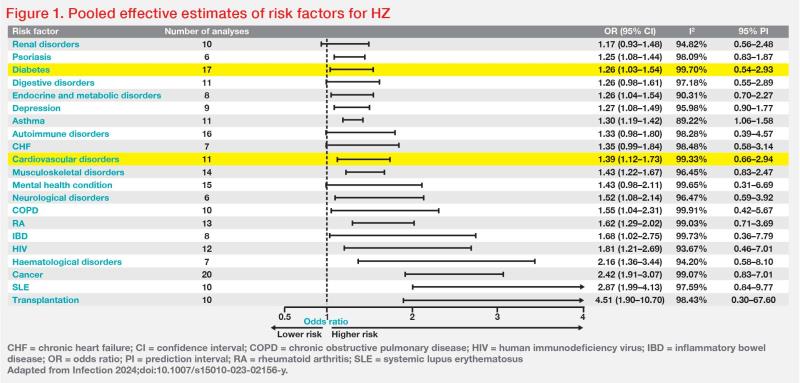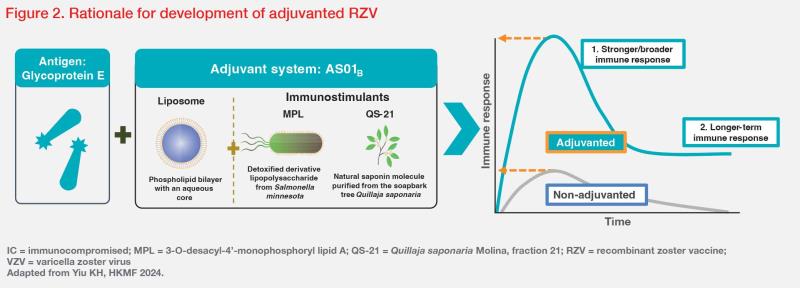Prioritizing herpes zoster prevention in patients with chronic diseases or immune-compromised conditions





Advanced age, chronic comorbidity, and immunodeficiency are established risk factors for herpes zoster (HZ). HZ is a debilitating condition that poses a significant burden on patients’ quality of life and the economy and has a bidirectional relationship with cardiovascular disease (CVD). At the 28th Hong Kong Medical Forum (HKMF), Professor Kai-Hang Yiu of the Department of Medicine, University of Hong Kong, presented an overview of the public health impact of HZ in high-risk patients with immunocompromised conditions or chronic diseases and discussed the long-term effectiveness of adjuvanted recombinant zoster vaccine (RZV) against HZ.
Burden of HZ in patients with impaired cell-mediated immunity
HZ, also known as shingles, is caused by reactivation of latent varicella zoster virus (VZV) and is characterized by a painful vesicular rash. [MMWR Recomm Rep 2008;57:1-30; BMC Med 2010;8:37] The lifetime risk of HZ in the general population is estimated to be approximately 30 percent. This risk markedly elevates after 50 years of age, with over two-thirds of cases occurring in this age group, due to agerelated decline in cell-mediated immune response. [BMJ Open 2014;4:e004833; BMC Med 2010;8:37]
However, older adults are not the only at-risk group. Patients with immunocompromised conditions [malignancy or the use of immunosuppressive medical treatments] or chronic diseases such as CVD and diabetes have a reduced VZVspecific cell-mediated immune response and are more susceptible to VZV reactivation. [Infection 2024;doi:10.1007/s15010- 023-02156-y]
Immunocompromised patients at the highest risk
A recent meta-analysis of 80 studies (10,904,736 HZ cases) reported that immunocompromised conditions such as transplantation, systemic lupus erythematosus (SLE), haematological disorders, and cancer were associated with the highest risk of HZ (pooled odds ratio [OR], 2.16–4.51). (Figure 1) [Infection 2024;doi:10.1007/s15010-023-02156-y]

Consistently, a US retrospective cohort study of 11,955 patients with a solid tumour revealed that the incidence of HZ was nearly 2 times higher in these patients vs the general US population (standardized incidence ratio [SIR], 1.9; 95 percent confidence interval [CI], 1.7–2.1). [Cancer Epidemiol Biomarkers Prev 2013;22:82-90]
A retrospective cohort study of 2,778,476 Japanese adults showed the overall incidence rate (IR) of HZ in the total cohort was only 4.92 per 1,000 person-years (PY) (95 percent CI, 4.86– 4.98). Of note, immunocompromised conditions such as haematopoietic stem cell transplant (IR, 151.68 per 1,000 PY; 95 percent CI, 111.45–201.71), haematological malignancy (IR, 28.18 per 1,000 PY; 95 percent CI, 22.75–34.52), and SLE (IR, 15.91 per 1,000 PY; 95 percent CI, 8.91–26.25) were associated with markedly increased IRs. [Dermatol Ther 2019;9:117-133]
CVD and diabetes heighten risk of HZ
Underlying chronic diseases such as diabetes (OR, 1.26; 95 percent CI, 1.03–1.54), CVD (OR, 1.39; 95 percent CI, 1.12–1.73), neurological disorders (OR, 1.52; 95 percent CI, 1.08–2.14), and chronic obstructive pulmonary disease (OR, 1.55; 95 percent CI, 1.04–2.31) also increased the risk of HZ. (Figure 1) [Infection 2024;doi:10.1007/s15010- 023-02156-y]
Of note, CVD is an important risk factor for HZ due to associated accelerated immunosenescence with expansion of CD4+CD28null and CD8+CD28null T cells. [PLoS One 2016;11:e0146750] HZ infection has also been shown to increase the risk of CVD due to VZV-induced inflammatory vasculopathy and pathological vascular remodelling. [J Clin Med 2019;8:547]
Elevated CV risk with HZ infection
This reciprocal relationship between CVD and HZ has been illustrated in a retrospective case-control study in Korea. Patients with heart failure (HF), ischaemic stroke, or myocardial infarction (MI) were found to be at increased risk of HZ (HF: hazard ratio [HR], 1.48; 95 percent CI, 1.04–2.11) (ischaemic stroke: HR, 1.51; 95 percent CI, 1.17–1.95) (MI: HR, 1.62; 95 percent CI, 1.14–2.30). Patients with HZ were also at greater risk of HF (HR, 2.03; 95 percent CI, 1.61–2.56), ischaemic stroke (HR, 1.52; 95 percent CI, 1.21–1.91), and MI (HR, 1.83; 95 percent CI, 1.35–2.47). [J Dermatol 2018;45:1312-1318]
“HZ patients are at higher risk of cardiovascular events due to VZV vasculopathy. This connection between CVD and HZ has important implications in patients with established CVD because once exposed to HZ, they are at greater risk of recurrent CV events,” highlighted Yiu. “HZ is not only an infection. It also causes complications that may require accident & emergency department visits and hospital admissions, straining healthcare systems and impairing patients’ quality of life.”
RZV boosts immune responses
RZV contains the recombinant VZV glycoprotein E (gE) antigen and liposome-based AS01B dual immunostimulant adjuvant system comprising 3-O-desacyl-4’-monophosphoryl lipid A and Quillaja saponaria Molina, fraction 21. (Figure 2) RZV has been shown to produce significantly greater antigenspecific humoral and T-cell immunity responses vs vaccination with gE alone. [Expert Rev Vaccines 2018;17:619-634]

“This two-dose adjuvanted RZV is designed to boost VZV-specific humoral and cellular immune responses, eliciting a stronger and longer-lasting protection against VZV,” pointed out Yiu. (Figure 2)
RZV: Strong HZ protection in high-risk patients
Two pivotal phase III randomized trials, ZOE-50 and ZOE-70, evaluated the efficacy of RZV vs placebo in reducing the risk of HZ. After a mean follow-up of 3.2 years, overall vaccine efficacy (VE) against HZ was 97.2 percent in adults aged ≥50 years enrolled in ZOE-50. A pooled analysis of participants aged ≥70 years in ZOE-50 and ZOE-70 revealed that VE was 91.3 percent. [N Engl J Med 2015;372:2087-2096; N Engl J Med 2016;375:1019-1032]
11 years of protection
Notably, a final analysis of ZOE-LTFU, a long-term follow-up study of ZOE-50/-70, demonstrated long-lasting efficacy of RZV, with overall VE of 87.73 percent at approximately 11 years after vaccination. No serious adverse events related to RZV were identified. (Figure 3) [Strezova A, et al, ESCMID Global 2024, abstract 09154]

Immunosuppressed & chronic conditions
RZV has been shown to offer strong protection against HZ in immunosuppressed patients. Overall VE reported from a subset of ZOE-50/70 participants with ≥1 potential immune-mediated disease (n=1,943) was 90.5 percent. A phase III randomized trial in 562 adults aged ≥18 years with haematological malignancies receiving immunosuppressive cancer treatments demonstrated a VE of 87.2 percent. [MMWR Morb Mortal Wkly Rep 2022;71:80-84; Lancet Infect Dis 2019;19:988-1000]
A post hoc analysis of ZOE-50/70 found that, amongst the 23,035 participants who reported ≥1 comorbid chronic condition, RZV was consistently effective against HZ across 15 comorbidities, with VE estimates ranging from 91.2 percent for patients with diabetes to 97.0 percent for patients with coronary heart disease. [Hum Vaccin Immunother 2019;15:2865-2872]
Public health benefits of mass vaccination
A mathematical model based on a population of 3.13 million Hong Kong adults aged ≥50 years revealed that without HZ vaccination, approximately 2 in 7 people (28.5 percent) will have HZ in their remaining lifetime. [Hum Vaccin Immunother 2023;19:2176065] “Importantly, mass vaccination with RZV at 40 percent coverage would reduce the number of HZ cases by 23.0 percent,” noted Yiu. “Of course, mass vaccination would also reduce the subsequent adverse sequelae of HZ, such as post-herpetic neuralgia.”
Guideline recommendations for RZV
The sustained efficacy and safety profile of RZV is recognized by a wide array of national and international guidelines from Australia, Europe, the Middle East, and North America. [Eur J Public Health 2022;32:ckac129.728]
The Centre for Health Protection in Hong Kong considers that locally available HZ vaccines are safe and effective, and recommends HZ vaccination in older adults and adults with immunocompromised conditions upon consultation with their healthcare providers for protection against zoster and its complications. [www.info.gov.hk/gia/general/ 202309/27/P2023092700607.htm]
Summary
HZ poses a health and economic burden for people at risk. RZV offers long-term protection against HZ and its use is recommended in Hong Kong and globally. Mass vaccination should be considered to mitigate the burden of HZ, especially in patients with chronic diseases and immunocompromised conditions.